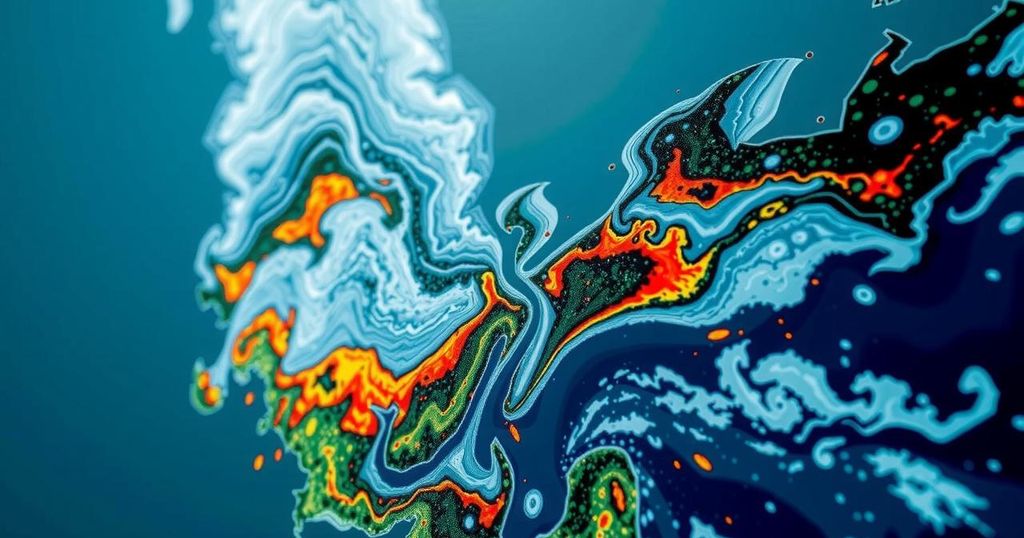Recent studies affirm that the climate crisis significantly exacerbates extreme weather events. Climate attribution techniques reveal that many modern heatwaves, floods, and storms are unprecedented compared to historical patterns and are largely due to human-induced climate change. Vulnerable communities suffer the most, highlighting the urgency for accountability and climate action.
The question of whether the climate crisis is responsible for the increasing frequency and severity of extreme weather events has garnered significant attention. Determining the impact of global heating versus natural weather patterns is complex. However, scientific advancements in climate attribution now provide compelling evidence that human-induced climate change has drastically altered our climate, leading to unprecedented heatwaves, floods, and storms that are far more severe than those witnessed throughout human history. Attribution studies utilize three primary approaches to evaluate extreme weather events: comparing present weather data to historical data, employing climate models to analyze modern conditions against preindustrial benchmarks, and simulating climate trends over time. Collectively, these methods allow scientists to determine how much more frequent or intense current extreme events are compared to those of the past. Recent attribution studies have yielded alarming findings. Notably, extreme heatwaves now occur that would have been inconceivable without the influence of global heating—at least 24 such heatwaves worldwide have emerged due to climate change. Beyond heatwaves, other extreme weather events such as heavy rainfall, droughts, and storms have been exacerbated by rising global temperatures, with three-quarters of 744 reviewed studies indicating significant impacts related to climate change. Heatwaves, in particular, have been extensively analyzed, with over 200 studies confirming that each event is made more likely or severe by climate change, with no instances recorded where it was less likely. Similarly, flooding events exhibit a more complex relationship with climate change, though over 60% of studies have shown increased severity or likelihood due to global heating. Moreover, attribution studies are beginning to address the human cost of extreme weather. Approximately 91% of studies assessing the impacts of extreme weather reveal aggravation due to climate change. For instance, some estimates suggest that one-third of newborns who succumbed to heat in certain regions would have survived had it not been for climate change-induced temperature increases. Additionally, studies have demonstrated that Hurricane Harvey would not have caused such extensive flooding in the United States without the influence of climate change. While the existing literature focuses primarily on extreme weather events, the vulnerability of communities plays a critical role in the human toll resulting from these impacts. Those in less affluent nations, with inadequate resources and infrastructure, face disproportionately higher risks compared to those in wealthier countries. As scientific inquiries continue, it is becoming apparent that climate attribution studies can serve a dual purpose—not only enhancing understanding of climate phenomena but also holding responsible parties accountable. These studies are increasingly being cited in significant legal cases addressing climate damage, while also informing policies regarding financial assistance for communities affected by climate disasters. In conclusion, the wealth of evidence substantiates the notion that the climate crisis is intimately linked to the heightened severity and frequency of extreme weather events experienced across the globe today. Continuous research in climate attribution will only deepen our understanding of this critical issue, underscoring the urgent need for remedial action to curtail climate change and its damaging effects on humanity and the planet.
Extreme weather events, including heatwaves, floods, and storms, have been intensifying globally, leading to severe consequences for human health and infrastructure. Understanding the underlying causes of these events and their association with climate change is vital, yet the assessment is complex given historical weather patterns. Advances in climate attribution science signal a progressive shift towards quantifying the impacts of human activities on weather phenomena, providing critical insights into mitigating future risks.
In summation, attribution studies have established a clear connection between the climate crisis and the escalation of extreme weather. The evidence indicates that human activities, particularly fossil fuel combustion, have fundamentally changed weather patterns, resulting in more frequent and severe events. Continued research in this domain is essential for both understanding these impacts and for informing effective climate action moving forward.
Original Source: www.theguardian.com







